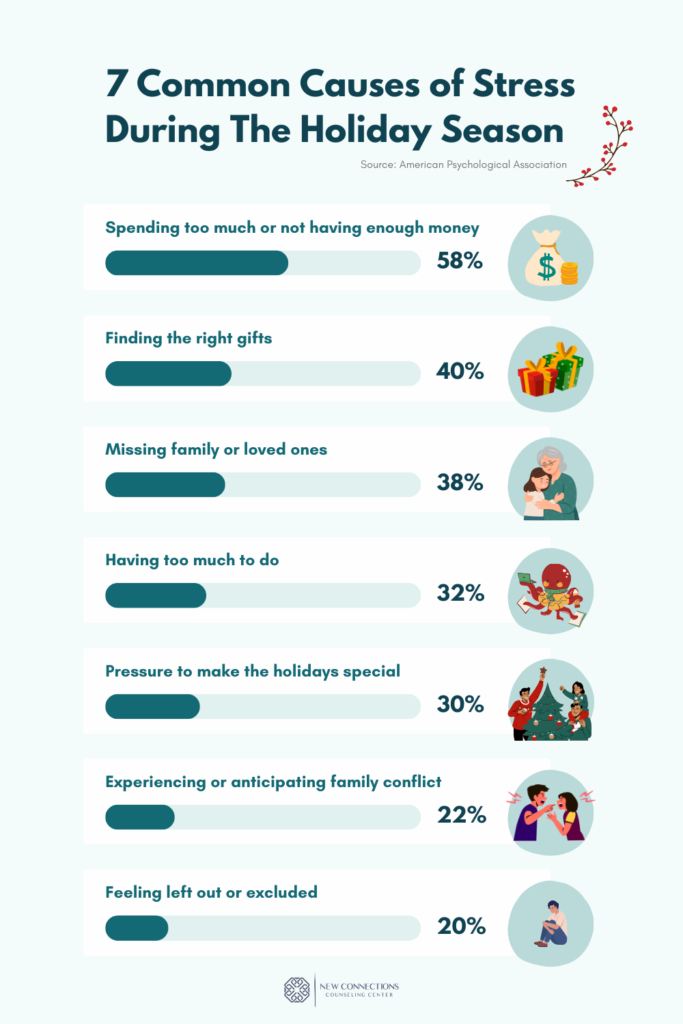The holiday season is upon us! Endless to-do lists, high expectations, and a lot of distant relatives are coming to town… Already feeling the stress hives? Check out our tips to break the cycle and put your well-being at the top of your list!
“It’s the most wonderful time of the year.” That’s a lot of pressure, right? Cooking the perfect dinner, picking the right gifts, creating extra special family moments… Every year we replay it and find ourselves singing along as if it were a Mariah Carey Christmas classic!
There’s a lot to look forward to about the holidays. Delicious family meals, all the lights and decorations, reconnecting with our friends and families. But there’s no denying that those joyful moments often come with a hefty dose of stress from all the planning, traveling, and juggling it takes to make them happen! So, why do we put ourselves through it over and over again?
If stress and anxiety seem to tag along with the holidays every year, why do we keep welcoming them in? Let’s dive into what makes the holidays so stressful — and, more importantly, how we can show ourselves a little extra care this year.
Why the Holidays Bring So Much Stress
If the weeks before Thanksgiving leave you feeling anxious, with stress levels building all the way up through Christmas and New Year’s, you’re far from alone.
According to the American Psychological Association (APA), 41% of U.S. adults report increased stress around the holidays. This becomes even more concerning since 43% of people admit that this stress interferes with their ability to enjoy the festivities.
But what’s behind all this extra stress during the holiday season? There are many reasons at play, but a few often stand out.
Most Common Causes of Stress During the Holidays
For many, financial pressures and the expectation of gift-giving take center stage. For others, family reunions are a painful reminder of the grief and longing of their loved ones. And on top of it all, there’s a neverending list of to-dos — cleaning, decorating, shopping, cooking — to ensure everyone gets their magical holiday celebration. No wonder the joy of the season can get overshadowed…
Moreover, these triggers can build on one another, creating a snowball effect that’s hard to escape. So, how can we break this draining cycle and focus on the moments that truly bring us joy and connection? Let’s find out!
7 Tips to Overcome Stress During the Holidays
In the spirit of ringing in the new year and the “out with the old, in with the new” motto, here are our do’s and don’ts to help you start the holidays stress-free.
1. Do: Take Time for Yourself
Don’t: Push Through It
Trying to tackle every holiday chore while running on fumes isn’t heroic — it’s harmful. Give yourself permission to rest. Even a 15-minute break can work wonders, boosting your energy and helping you return to the task feeling calmer and recharged.
A nap, a quiet cup of tea, or a moment to breathe can go a long way. Plus, did you know that simply stepping outside for fresh air and sunlight can help relax you and lift your mood? Numerous studies show that time spent outdoors has significant mental health benefits.
The key is to choose something that works for you—whatever helps relax your body and calm your mind.
2. Do: Set Boundaries
Don’t: Say Yes to Everything
The holiday season often packs a lot of responsibilities and social commitments into a short window, making it all too easy to overcommit your time. When looking at your calendar, be kind to yourself. Prioritize what truly matters to you — not just the activities, but also the people you want to spend your time with.
It’s okay to say no to things that add stress, whether it’s attending a party or handing off a task from your already overflowing list. Saying no doesn’t make you a Scrooge; it makes you someone who respects your own limits and well-being.
3. Do: Budget Your Spending
Don’t: Overcommit Financially
The holidays often bring extra spending, which is why it’s crucial to set a budget and stick to it. While giving gifts is a meaningful tradition, it’s important to manage your finances responsibly — don’t buy gifts that leave you starting the year in debt.
A thoughtful gift can express your care more than something expensive. Homemade gifts or treats are often more appreciated, and can even become a cherished holiday tradition.
Remember, “it’s not about the price tag.” Heartfelt, meaningful gifts or shared experiences are what truly matter.
4. Do: Respond with Kindness
Don’t: Hold Onto Grudges
We all have different perspectives, and social gatherings can sometimes bring tension, especially with family. Past conflicts or disappointments can make these moments even more challenging. While you can’t control how others behave (unfortunately), you can control how you respond in these situations.
Focus on finding common ground: what brings you together, rather than what divides you. If things become too tense, setting clear boundaries or stepping away for a moment can be effective ways to de-escalate and protect your well-being.
5. Do: Keep Healthy Habits
Don’t: Overlook Your Routine
The holidays are infamous for encouraging not-so-healthy habits. That’s why sticking to them is one of the best defenses against stress. Our bodies thrive on routines, so resist the urge to compromise your rest for late-night parties or holiday prep. Getting enough sleep will help you navigate the season with calm and clarity.
Fuel your body with energy-boosting, plant-based foods like salads and roasted veggies, while cutting back on red meat and processed food. And remember, moderation is key, especially when it comes to holiday treats and alcohol, which can be tempting to overindulge in.
6. Do: Simplify Travel Plans
Don’t: Overextend Your Car Time
Traveling during the holidays can be a major source of stress. So, if you really need to do it, plan ahead to make your journey as stress-free as possible. Keep it simple, whether that means booking a direct flight, coordinating carpools, or scheduling downtime between visits.
One common complaint is spending too much time in the car. It’s not just exhausting — it can test everyone’s patience. And let’s face it, there’s definitely such a thing as too much family togetherness, especially when you’re all crammed into a tight space. Why start the celebrations already burned out?
7. Do: Ask for Support
Don’t: Bottle Up Your Feelings
The holidays can stir up a mix of emotions, and that’s completely normal. But you don’t need to face it alone. Acknowledge your feelings and share them with your loved ones. When you’re honest about your struggles, you create space for connection — and might even inspire others to share their own challenges.
If the holidays feel particularly difficult, don’t hesitate to seek professional support. Talking with a therapist can help you navigate stress and anxiety, set boundaries, and prioritize your well-being — not just during the holidays, but year-round!
Find Support for Stress During the Holidays in Baltimore, MD
Feeling overwhelmed by the holiday hustle? Struggling to manage stress, family dynamics, or the weight of unrealistic expectations? You’re not alone. The holiday season can stir up a lot of emotions, and sometimes, the pressure can feel like too much to handle.
If you’re finding it hard to cope, seeking support from a therapist can be a powerful step. Our therapists in Baltimore can help you manage difficult emotions and develop healthier ways to cope with holiday stress.
Remember, prioritizing your well-being is the best gift you can give yourself — and it can transform the way you experience the season. Don’t hesitate to reach out for the support you deserve. Reach out to know more, or schedule a free 15-minute consultation here.







